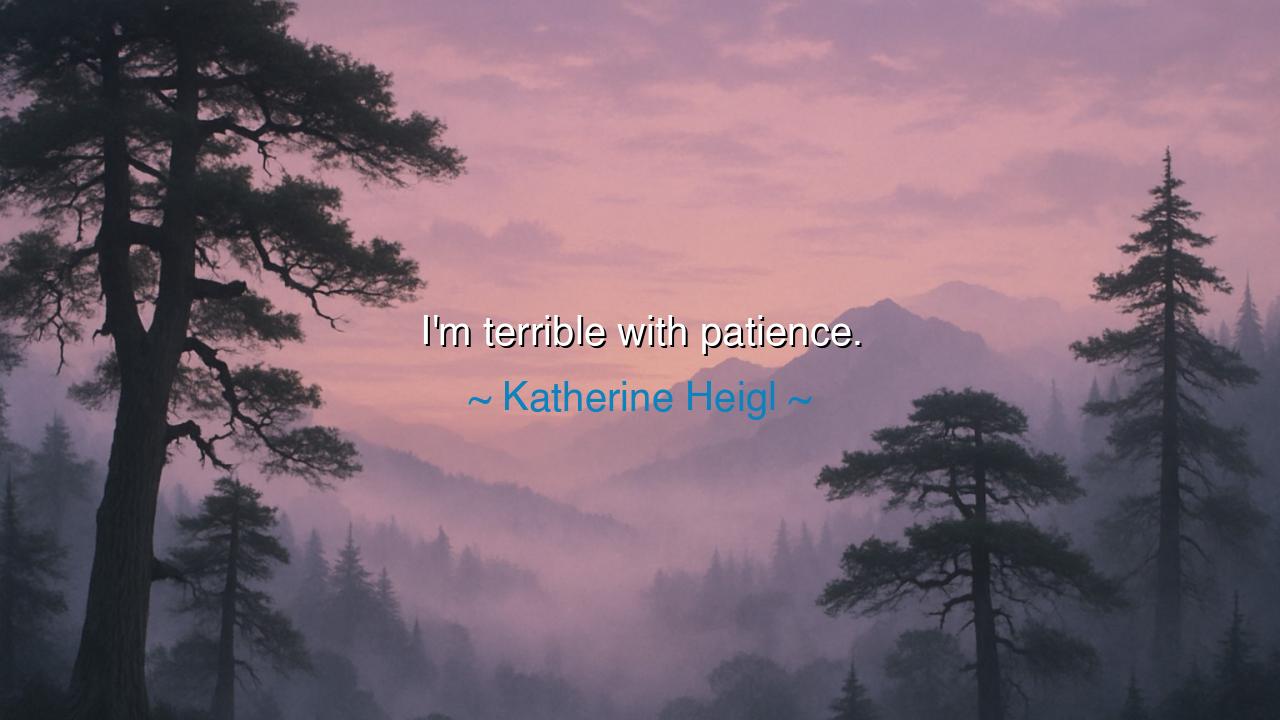
I'm terrible with patience.






Hear the candid confession of Katherine Heigl, who once declared: “I’m terrible with patience.” Though simple in sound, these words strike like a mirror held before every restless soul. For in them lies the struggle of mankind across the ages: the tension between desire and delay, between the yearning of the heart and the slow unfolding of time. To admit a weakness in patience is not a boast, but a revelation of the human condition, for who among us has not battled the fires of restlessness, the hunger for results before the season of ripening has passed?
The ancients, too, wrestled with this truth. The farmer who planted his seed and then tore it up to check its growth was a fool, mocked by his neighbors, for he destroyed with haste what he sought to bring forth. The sailor who set forth before the winds were ready doomed his voyage to ruin. And yet even in their folly, they revealed the eternal lesson: that patience is not mere waiting, but trust—trust in time, trust in labor, trust in the unseen workings that cannot be rushed. To confess one’s struggle with patience is to confess one’s humanity, for even the wisest must learn this virtue slowly.
Consider the life of Thomas Edison. When he pursued the invention of the light bulb, he faced thousands of failures. By his own words, he found ten thousand ways that did not work. Had he been “terrible with patience,” as Heigl confessed of herself, he might have abandoned the task after the first hundred failures, or even the first thousand. But his persistence—his unwillingness to surrender to restlessness—became the lantern that lit the modern world. His story shows us what is lost when patience is absent, and what is gained when it is present.
Yet, there is also a hidden strength in Heigl’s words. For to know one’s weakness is the beginning of transformation. The proud who deny their faults never change; but the honest, who admit, “I am terrible with patience,” place themselves upon the path of growth. For it is only through awareness that the muscle of patience may be trained, as Easwaran once taught. In confession lies the seed of wisdom, for the one who knows they are impatient may learn to slow themselves, while the one who refuses to see their haste will continue to stumble.
The deeper meaning here is this: restlessness is a fire that, if guided, can drive ambition, but if left untempered, can consume peace and destroy progress. To be terrible with patience is to risk spoiling the harvest before it ripens, to push too soon, to grasp too quickly. Yet even restlessness can be a teacher—it reveals where the soul still clings to control, where trust in life’s unfolding has not yet been cultivated. Every restless heart carries within it the invitation to surrender, to learn the rhythm of time.
History abounds with examples of those undone by impatience. Napoleon, in his haste to dominate Russia, ignored the warnings of winter and destroyed his army in the snow. His ambition outpaced his wisdom, and his downfall became legend. But we also see the opposite: the patience of Mandela, who endured twenty-seven years in prison before he emerged to lead his people. One was broken by haste, the other crowned by endurance. Here lies the lesson: to be “terrible with patience” is to stand at a crossroads—either to remain enslaved by restlessness or to confront it and grow.
The teaching for us is clear: each of us must face the question of patience. When you feel the burning of delay, do not curse it, but see it as training. Use small acts of waiting—listening without interrupting, enduring hardship without complaint, tending to your work even when reward is far—to grow stronger in this virtue. Do not despise your weakness, but admit it, as Heigl did, and let that honesty become the soil in which patience may take root.
Thus let her words echo not as a boast, but as a challenge: “I’m terrible with patience.” Take them into your heart as a reminder of your own struggles, and as an invitation to transform them. For though none are born masters of patience, all may learn it, step by step, trial by trial, delay by delay. And in mastering it, you will master not only your waiting, but yourself.






AAdministratorAdministrator
Welcome, honored guests. Please leave a comment, we will respond soon